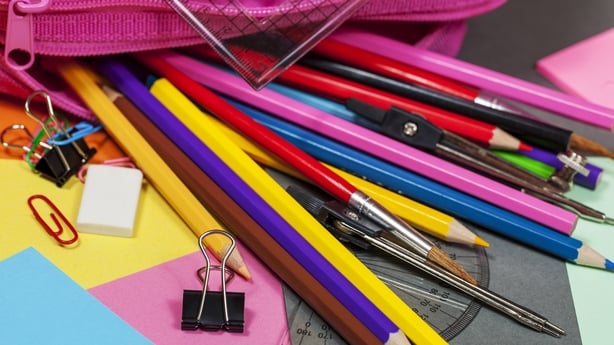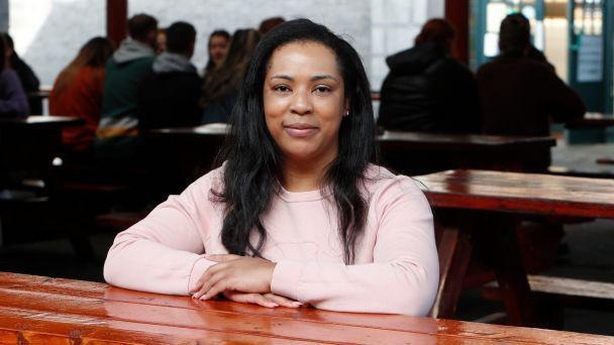Organisations supporting international protection applicants say delays in accessing vital services and supports are making it difficult for some families to send their children to school.
As students return to the classrooms this week, the Movement of Asylum Seekers in Ireland (MASI), the Irish Refugee Council and Every Child is Your Child said they have seen a surge in requests for help.
"We are receiving a lot of calls from parents who are unable to get their kids to school because some of them don't have PPS numbers, and they can't get the back-to-school grants," MASI co-founder Lucky Khambule said.
"They reach out to us to see what we can help, buying uniforms, books and all that they need to go back to school.
"We have a lot of distressed parents, more than over the last few years, this is worse. They don't know what to do," Mr Khambule said.
Amanda* is among them.
She described her efforts to ensure her children attend school this term as "frustrating" and "heart-breaking".
Amanda said she and her family came to Ireland seeking international protection three months ago, and while she received her Personal Public Service or PPS number one month ago her children did not.
She said that she was advised to make a new application for her children's PPS numbers, but while she waits, she said getting her children into school is proving challenging.
"So, each time I call any school to apply for my kids they say ... you can't come to school without PPS numbers," Amanda said.
However, a Department of Education spokesperson confirmed that the absence of a PPS number should not prevent the enrolment of a child in school.
In the end, following the intervention of a social worker, Amanda said she was put in touch with schools that accepted her enrolment applications, but her children were only offered places in the last few days.
'Serious struggle'
However, without access to financial supports she said she still does not know how she will manage.
As she has been here for less than six months, Amanda is currently precluded from working.
PPS numbers are needed to access the basic financial supports an international protection applicant is entitled to, including the weekly payment of €38.80 for an adult and €29.80 for a child, and at this time of year, the back-to-school clothing and footwear allowance.
"It's been really stressful, because normally [when] school is coming you are supposed to be getting prepared, you get the school stuff ready, but since we are not working and there is no income, there is no money, it has been a serious struggle for me," Amanda said.

"I find myself crying at night. When these kids get back to school, what are they going to put on? No footwear, no school bag, no nothing. It has been very emotional for me," she added.
She said she is aware of a number of other parents in the hotel she is living in, who are similarly waiting for PPS numbers for their children.
"We hear that without PPS numbers we can't get access to any money," Amanda said.
She said she has nevertheless attempted to apply for a Public Services Card, but has been informed that there are no available appointments until October.
She hopes that she will be able to send her children to school on Monday.
So far, she has borrowed some money and said she has managed to organise parts of the children's uniforms, but further expenses await.
"We need around €135 for the books. I don't know where I am going to get money for the books," she added.
"I don't want them to feel odd in the class, so I should focus on getting them at least the uniform so they can be identified with their mates," she said.
In June this year, it was reported that international protection applicants had experienced delays in obtaining their Temporary Residence Certificate (TRC) cards, which in turn were required before someone could apply for a PPS number.
Policy and Advocacy Officer for the Irish Refugee Council Ciara Ross said there were "still delays in processing" PPS numbers and TRC cards.
"I would say it is slightly down from the summertime but some people would still be waiting since June, since July," she said.
In a statement the Department of Justice said that "the issue that arose earlier this year in relation to the issuance of TRC cards has now been resolved," and that there were currently "16 applicants awaiting a call back appointment for languages where interpreters are not readily available, 10 of whom have been scheduled for appointment today (2 September 2022)."
The statement went on to say that "the (International Protection Office) IPO is determined to maintain the positive momentum... and continues to ensure that the vast majority of new applicants receive their TRC cards on the day of application and keep the need for call back appointments to an absolute minimum."
Accommodation shortage
Ms Ross said that while there were "specific and important administrative issues around the PPS and TRC there was also a broader issue around the "pre-reception model" or the "emergency response" in accommodation shortages, which did not offer the same a comparable level of support as the National Reception Centre in Balseskin in Dublin, for example.
She said that this resulted in people not knowing "how to apply for a PPS number, no idea how to apply for a medical card, like really no idea about how the system works".
A statement from the Department for Children, Equality, Disability, Integration and Youth said it had "enlisted partners in the NGO sector, and from our colleagues in Health and DoE, Tusla, to provide wrap-around services at our pre-reception locations, which have been established to meet unprecedented emergency demand for our accommodation in recent months".
"In addition to this, representatives from (the International Protection Accommodation Service) IPAS have conducted consultation clinic visits to our pre-reception locations which are open to all residents, where IPAS staff can listen to any issues they are experiencing, in confidence, and assist with problems they may have – including queries relating to PPSNs and medical cards" the statement added.
In June, the Department for Social Protection said that applications for PPS numbers from international protection applicants "can take up to three weeks where the application is fully completed, and the necessary supporting documentation is provided".
Yesterday, a department spokesperson said a dedicated team is in the Dublin region which deals with international protection applicants and has arrangements in place so that PPSN applications are "generally processed within approximately one week of the application being received, where the form has been fully completed and the required supporting documentation has been provided".
Ms Ross said that child asylum seekers were finding themselves locked out of education for other reasons too.
For example, among the hundreds currently staying in the Citywest Transit Hub in Dublin "there are lots of children there and young unaccompanied minors who need access to school".
Ms Ross said that currently the Citywest centre would not supply residents with proof of address ... despite the fact that some people had been there "for months".
Under the EU Recast Reception Directive, children of international protection applicants are required to receive an education within three months of arriving in the State, allowing for holidays.
A spokesperson for the Department of Children, Equality, Disability, Integration and Youth said that the transit hub in Citywest is "intended to be temporary accommodation, where people are processed before being moved on."
"People are spending longer there than had been intended due to a shortage of accommodation, but the intention remains to secure accommodation for them as soon as possible," it added.
7,080 international protection applicants arrived in Ireland this year up to 13 July.
Mr Khambule said that while there were large numbers and a backlog, one day of missed school "is one day too much".
"Life must go on, kids must go to school, that should be the priority," he said.
Donnah Vuma is the founder of Every Child is Your Child, which runs a back-to-school support initiative for international protection applicants.
"We have been running this initiative for five years and I suppose this is one of the most challenging years," she said.
"This is due to the fact that there are so many people in the emergency accommodation centres, in the temporary accommodation centres and the temporary reception centres," Ms Vuma said.

Some people "do not have access to the basic supports like the weekly allowance," she added.
As a result, Every Child is Your Child has shifted its focus this year away from supporting those in traditional direct provision accommodation, to those in emergency and reception centres, who she described as being "those most in need".
"We are not turning anyone away if they do reach out, but we are prioritising those who are in more precarious living conditions," Ms Vuma said.
Amanda has been given a different name to protect her identify and the identities of her children.







